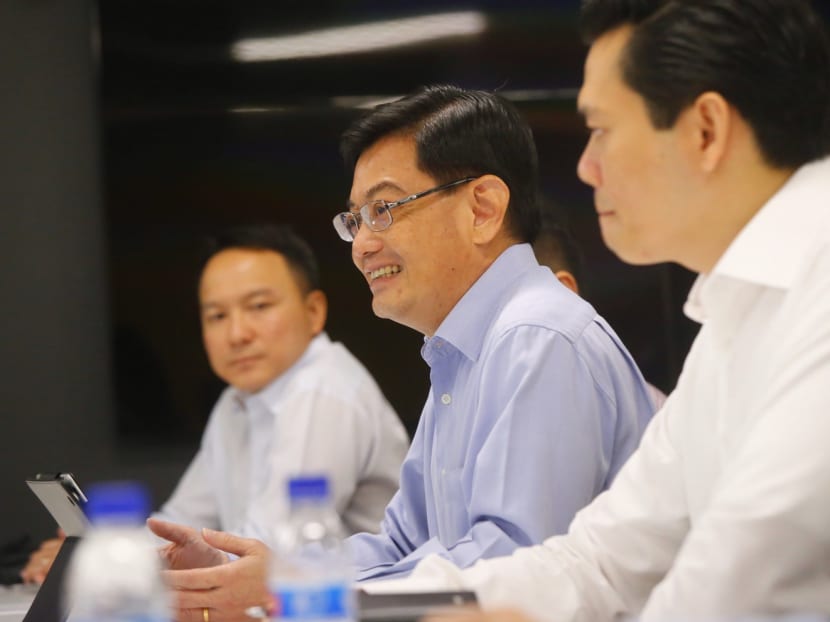S’pore must grasp global economic picture: Heng
SINGAPORE — The implications for Singapore of an increasingly volatile global economy and countries’ pursuit of sustainable rather than breakneck-speed growth are among the issues that the newly-formed economic review committee will look into, Finance Minister Heng Swee Keat said yesterday.

Newly-minted Finance Minister Heng Swee Keat at JTC LaunchPad@One-North to observe and interact with key local start-ups. Photo: Ernest Chua
SINGAPORE — The implications for Singapore of an increasingly volatile global economy and countries’ pursuit of sustainable rather than breakneck-speed growth are among the issues that the newly-formed economic review committee will look into, Finance Minister Heng Swee Keat said yesterday.
Domestically, it will have to examine the “structural issues”, said Mr Heng, who will chair the committee. “How do we continue to restructure and upgrade our economy so that our drive towards high productivity, higher skills and an innovation-driven economy can sustain our growth for many years to come?”
On Thursday, Prime Minister Lee Hsien Loong announced at the swearing-in ceremony for the new Cabinet that Mr Heng will chair a committee on “The Future Economy” to look at ways to help workers and businesses adapt in the face of a weaker global economy and leaner workforce.
Speaking to reporters after touring start-up hub Launchpad yesterday, Mr Heng said he would share details of the team he is assembling for the committee later.
Elaborating on the issues that the committee would be pre-occupied with, he said: “Many (countries) are looking at how they can grow more sustainably. They have not been seeking to grow at breakneck (speed).
“So you see structural adjustments taking place in China ... as well as changes in Europe and America — (these) will all have an impact on us. So it’s very important for us to understand these changes more deeply, and to understand the implications for us.”
He added: “This is a very dynamic and uncertain environment and, therefore, we must do our best to understand what is happening, and once we do that, we’ll (be in) a better position to respond.”
As Finance Minister, one of his first key tasks is to “work closely with economic agencies, companies and unions to see how we can continue to create a vibrant economy, even in the midst of the global slowdown”, Mr Heng said. “With a growing economy, we can then generate resources to invest in our future,” he added. A “stock-take” is also in order, he said. “We need to do an assessment now to see what are the key changes in the global economy, regional economy and our own domestic economy, what are the challenges we have, where we are today, what are the key things we need to do going forward.”
Economists interviewed by TODAY said Singapore’s economy, being smaller and more open compared to others in Asia, will have to adapt to this new and complex environment.
Barclays economist Leong Wai Ho said: “Singapore as an open economy would feel it quicker through trade channels, because our trade and investment linkages are very strong. So it increases the urgency to be more productive within the domestic economy. Generally, we need to garner more growth by being more efficient.”
He added that slower growth may not be bad for Singapore and a more “sustainable growth mix” is “the new normal”.
“Slower growth may not a bad thing, given that we are at full employment and cannot grow faster without hitting our natural constraints (in terms of land, labour) and without pushing costs much higher,” he said.
Concurring, UOB economist Francis Tan said slower growth would affect different industries differently. “Companies manufacturing cheap items might not do well. But for luxury items, China can continue to be their market,” he added.
He added that small and medium enterprises that have their production bases in China might have to look elsewhere, such as at the Association of South-east Asian Nations (ASEAN). “(ASEAN) as a whole has half the population of China, so it is also a big opportunity,” he said.
The committee headed by Mr Heng will be the third convened in the past 14 years by the Government to review its economic strategies. In 2001, an Economic Review Committee was set up, led by Mr Lee who was then Deputy Prime Minister. It had seven sub-committees looking at issues such as strengthening entrepreneurship and developing an edge in the service industry. It took two years to come up with recommendations.
In 2009, the Economic Strategies Committee, led by then Finance Minister Tharman Shanmugaratnam, took a year to come up with recommendations, among them strategies to develop links between research and enterprise, and drive inclusive economic growth. On the timeline for the latest committee’s work, Mr Heng said: “The last economic strategies committee took about a year, so it’s not something you can rush through.”






